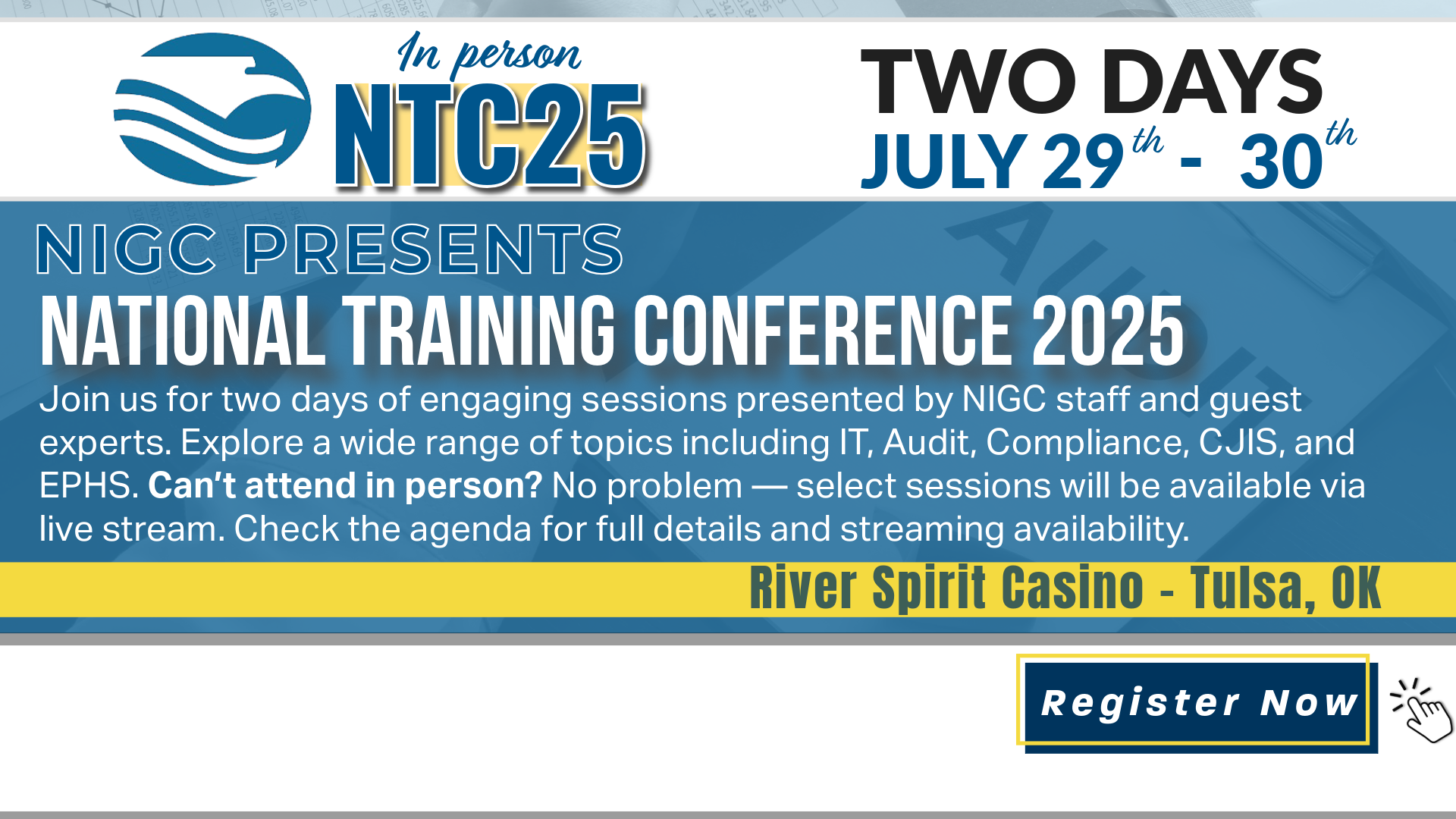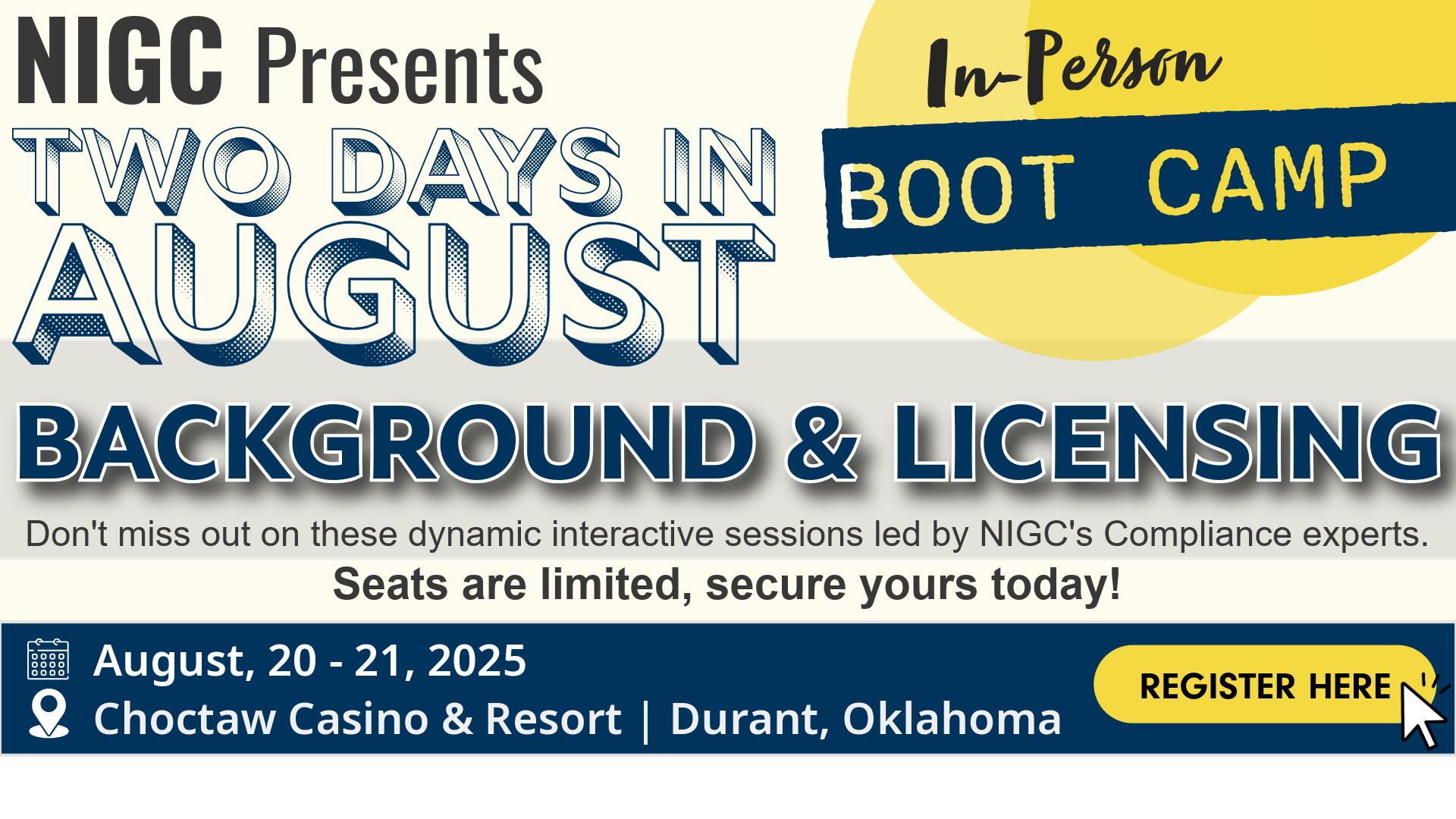For Immediate Release
Media Contact: Keith Martinez
(202) 632-7003
NIGC Presents Certificate of Self-Regulation to the Pokagon Band of Potawatomi
WASHINGTON, D.C., Tuesday, March 25, 2019 – National Indian Gaming Commission (NIGC) presented a certificate of self-regulation to the Pokagon Band of Potawatomi at their annual citizen’s meeting which was held at the Mendel Center at Lake Michigan College. The tribe’s certificate of self-regulation went into effect on January 1st, 2019.
The Pokagon Band of Potawatomi is just the fifth tribe to be granted a self-regulation certificate from the NIGC.
Under the Indian Gaming Regulatory Act (IGRA) and NIGC regulations (25 C.F.R. Part 518), self-regulation status allows a tribe to regulate Class II gaming with reduced oversight from the NIGC. The Commission only issues certificates of self-regulation to a tribe that can demonstrate it has satisfied the applicable requirements, which include a three-year review to ensure its gaming activities have been in compliance with the IGRA, NIGC regulations, and the tribe’s laws and regulations.
“I commend the Tribe for being able to achieve self-regulation status under IGRA,” said NIGC Chairman Jonodev Chaudhuri. “The Pokagon Band of Potawatomi has worked hard to reach this status and continues to demonstrate self-sufficiency and self-determination, key principles outlined in IGRA. The Tribe ensures that its operations will continue to benefit its citizens and communities for years to come.
As part of the self-regulation process, the NIGC spent a significant amount of time reviewing the Tribe’s gaming regulatory structures. This review process ensures that the Tribe has conducted its gaming activity in a manner that effectively accounts for all gaming revenue; that it has a reputation for a safe, fair, and honest operation; and that it is free of criminal or dishonest activities. Additionally, the NIGC confirms that the Tribe’s gaming operation is operated on a fiscally sound basis and that it has adequate systems for accounting, investigations, licensing, and enforcement.
“We are honored to be the first tribe in Michigan and Indiana to receive a Certificate of Self-Regulation from the National Indian Gaming Commission. This achievement emphasizes the Pokagon Band’s dedication and commitment to regulatory excellence and the preservation of our Tribal sovereignty,” said Matthew Wesaw, Chairman of the Pokagon Band of Potawatomi Indians. “I want to thank the Pokagon Band Gaming Commission for their continued diligence and determination that not only made self-regulation possible but also ensures that our gaming operations are conducted honestly and free from unlawful conduct and corruptive elements.”
“Achieving self-regulation is the result of a rigorous process that examines a tribe’s capacity to protect its sole propriety interests. The Pokagon Band of Potawatomi worked hand-in-hand with NIGC officials to demonstrate that it met the necessary requirements outlined in IGRA,” said NIGC Associate Commissioner and the Director of the Office of Self-Regulation E. Sequoyah Simermeyer. “I am grateful to all the individuals who contributed to the review process and congratulate the Pokagon Band of Potawatomi on their self-regulation status.”
###
The Indian Gaming Regulatory Act created the National Indian Gaming Commission to support tribal self-sufficiency and the integrity of Indian gaming. The NIGC has developed four initiatives to support its mission including (1) To protect against anything that amounts to gamesmanship on the backs of tribes; (2) To stay ahead of the Technology Curve; (3) Rural outreach; and (4) To maintain a strong workforce within NIGC and with its tribal regulatory partners. NIGC oversees the efficient regulation of 506 gaming establishments operated by 246 tribes across 29 states. The Commission’s dedication to compliance with the Indian Gaming Regulatory Act ensures the integrity of the growing $32.4 billion Indian gaming industry. To learn more, visit www.nigc.gov and follow us on Facebook and Twitter.
Download the PDF here.









